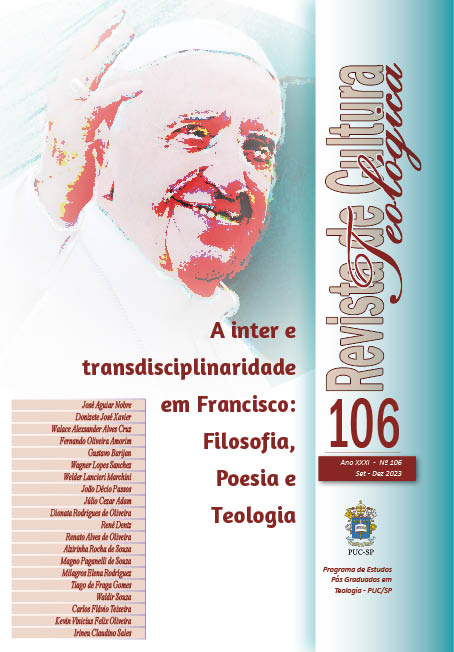Juventude, subjetividade e o futuro da Igreja
Mots-clés :
Juventude, Individualismo, Subjetividade, Diálogos, Sentido, ResistênciaRésumé
para que a Igreja estabeleça uma conexão com as questões antropológicas contemporâneas, especialmente no que diz respeito à subjetividade e suas necessidades. No entanto, a pandemia exacerbou tendências narcisistas, levando nossa subjetividade a se afundar na cultura do ressentimento, revelando um individualismo excessivo que dificulta a abertura ao próximo, resultando em rivalidades constantes. Isso implica na relutância em pedir ajuda ou fazer um apelo, pois tais ações são frequentemente percebidas como “fraqueza” e vulnerabilidade. A subjetividade contemporânea enfrenta desafios ao transformar a dor em sofrimento, uma vez que o diálogo e a interlocução são limitados. Isso resulta na sensação de queda em um abismo, onde a falta de sentido prevalece. O corpo, então, busca significados imediatos e espaciais, afastando-se das temporalidades que possibilitam a experiência de alteridades e da própria humanidade. Nesse contexto, como a juventude se posiciona? Como podemos abordar a relação entre os jovens e o futuro da Igreja diante dessas circunstâncias desafiadoras?
Références
AGAMBEN, Giorgio. Estado de exceção. São Paulo: Boitempo, 2004.
AMHERDT, François-Xavier. Interview realisée par “Observatoire de l’évangélisation”, PUC-Minas, 2022.
BAUDRILLARD, Jean. A sociedade de consumo. Lisboa: Edições 70, 1995.
BÊTA, Janaína Laport. Madras: arte e sagrado em Arthur Bispo do Rosário. Rio de Janeiro: Tempo Brasileiro, 2012.
BIRMAN, Joel. O sujeito na contemporaneidade. Rio de Janeiro: Civilização Brasileira, 2014.
BOFF, Leonardo. Reflexões de um velho teólogo e pensador. Petrópolis: Vozes, 2019.
FERNANDES, Sílvia. Trajetórias religiosas de jovens sem-religião. In: Revista Interseções. Rio de Janeiro: UERJ, 2018.
FERRY, Luc. Aprender a viver: filosofia para os novos tempos. Rio de Janeiro: Objetiva, 2012.
FRANCISCO, Papa. Fratelli Tutti: Carta Encíclica sobre a fraternidade e a amizade social. Brasília: CNBB, 2020.HAN, Byung-Chul. A sociedade do cansaço. Petrópolis: Vozes, 2017.
JOBIM, Solange. Experiências religiosas da juventude contemporânea: indagações sobre fé, secularização, ética e política. Rev. psicol. polít. [online]. 2014, vol.14, n.29, pp. 137-150.
HERVIEU, Danièle. Vers l´implosion. Paris: Seuil, 2022.
LASCH, Christopher. A cultura do narcisismo. Rio de Janeiro: Imago, 1983.
LAUREANO, Delze dos Santos. Direito das minorias: desafios epistemológicos. Belo Horizonte: Initia Via, 2015.
NOVAES, Regina. Juventude e religião: sinais do tempo experimentado. In: Revista Interseções. Rio de Janeiro: UERJ, 2018.
RIBEIRO, Nilo. Sabedoria da carne: uma filosofia da sensibilidade ética em Emmanuel Lévinas. São Paulo: Loyola, 2019.
ZIZEK, Slavoj. Capitalistas sim, mas zen. Entrevista ao Jornal Le Monde Diplomatique. 2005.
Téléchargements
Publié-e
Comment citer
Numéro
Rubrique
Licence
© Revista de Cultura Teológica 2023

Cette œuvre est sous licence Creative Commons Attribution - Pas d'Utilisation Commerciale - Pas de Modification 4.0 International.
Os autores concedem à revista todos os direitos autorais referentes aos trabalhos publicados. Os conceitos emitidos em artigos assinados são de absoluta e exclusiva responsabilidade de seus autores.

